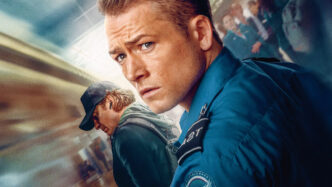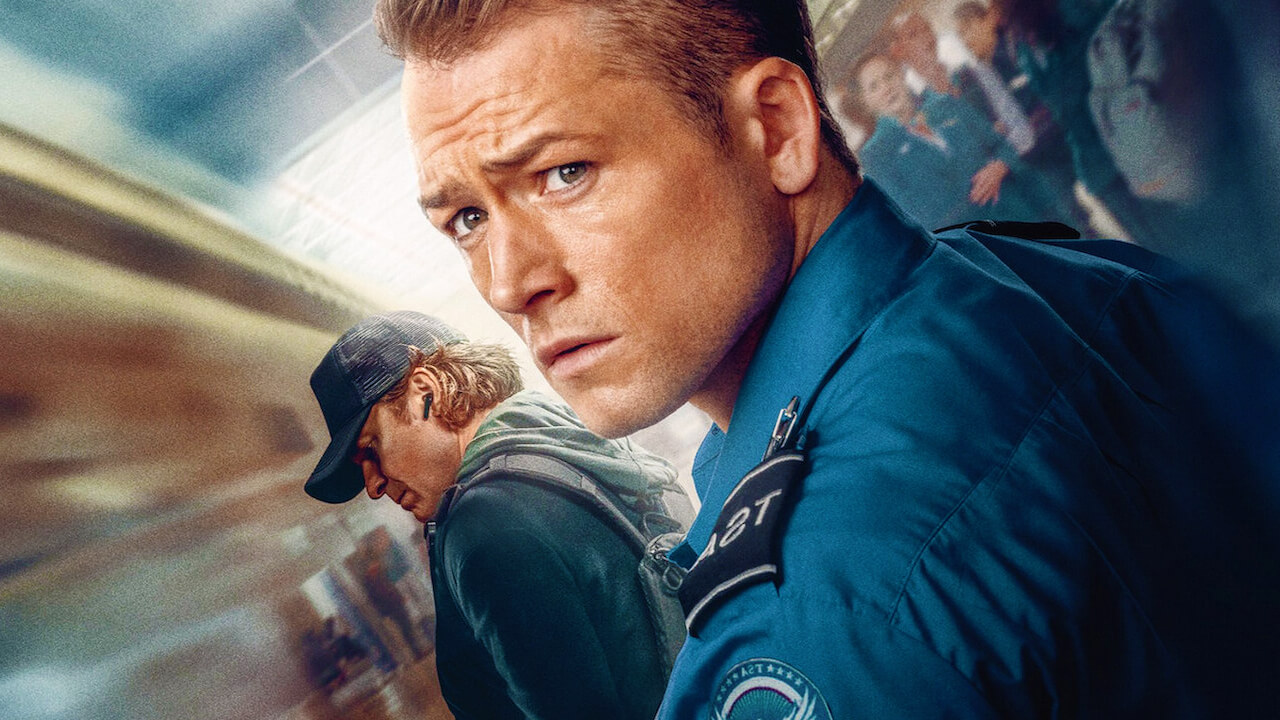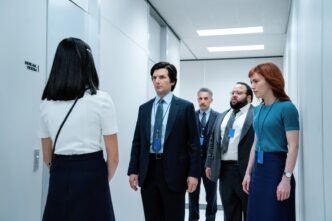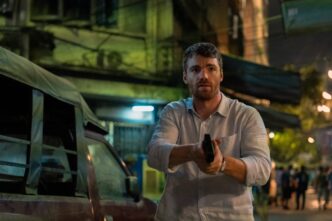A Modern Take on Die Hard
Summary
A gripping thriller with a classic feel, elevated by Taron Egerton’s performance and a suspenseful airport setting. Though not perfect, its moral dilemmas and tense atmosphere make it a worthwhile watch.
Overall
-
Plot
-
Narrative
-
Acting
-
Characterization
-
Action
-
Pacing
Netflix’s new holiday thriller Carry On offers a refreshing change from the usual seasonal lineup of sentimental dramas and formulaic comedies. Instead of cozy fireside moments, it delivers tension, moral dilemmas, and relentless pressure set against the backdrop of one of the busiest travel days of the year. The film embraces a stripped-down approach to action storytelling, recalling when Hollywood produced single-location thrillers featuring ordinary people in extraordinary circumstances. Here, the hero is not a trained operative or a mythic figure; he is a regular working man facing a crisis that tests his sense of right and wrong.
Jaume Collet-Serra directs with his knack for contained, pulse-pounding narratives, this time set in an airport checkpoint on Christmas Eve. Taron Egerton stars as Ethan Kopek, a diligent Transportation Security Administration (TSA) agent who wants nothing more than to do his job and care for his family. On what should be a festive day, Ethan finds himself trapped between a ruthless villain and a massive potential disaster. He must allow a dangerous package through security or suffer consequences that could destroy his life. With little time, he must choose between saving countless strangers or protecting the one he loves most. This moral puzzle fuels the tension that runs throughout the film.
From the moment the threat appears, Carry On immerses viewers in Ethan’s predicament. We sense the chaos of holiday travel as passengers rush to reach their gates, lugging suitcases and restless children. The hum of announcements, the sound of zippers, and the steady beep of scanners form an unsettling chorus. The airport’s orderly structure, designed for safety and efficiency, becomes a stage for psychological warfare. Ethan must appear calm and professional while a mysterious voice in his earpiece dictates every move. His job is to protect people, yet now he must betray that duty to save the one he cherishes. The tension arises not from car chases or explosions—at least not initially—but from a moral no-win scenario demanding personal sacrifice.
The script, by T.J. Fixman, strikes a balance between complexity and clarity. It frames the central dilemma so we understand it immediately. We know what is at stake as soon as Ethan receives the ultimatum. The film avoids flashy exposition or convoluted twists. Instead, it trusts the audience to grasp the conflict: do you save many or the one you love? By posing this question, Carry On becomes a human drama beneath its action premise. At the same time, it never forgets to entertain. Each scene nudges forward, intensifying the tension as Ethan tries subtle methods to signal for help or exploit loopholes in the villain’s demands. Some attempts work; others fail, but all keep us on edge.
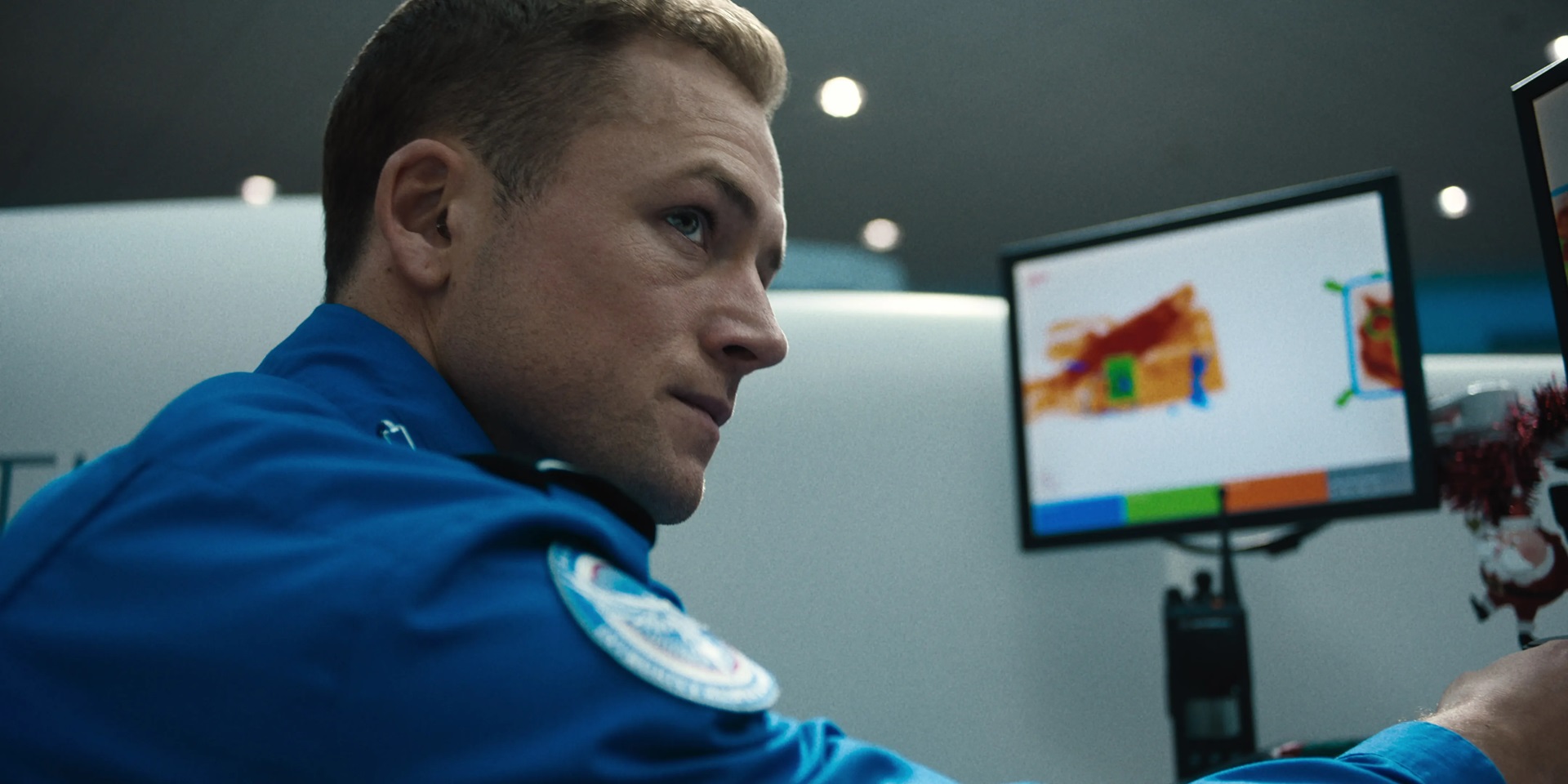
Egerton’s performance anchors the film emotionally. Known for more flamboyant roles, here he is subdued. He plays a man who knows the smallest misstep could prove fatal. His eyes reflect stress, fear, and anger as he struggles to maintain a calm exterior. His character has no superhuman skills. He cannot take on an army alone. Instead, his strength lies in a moral compass and the ability to think quickly. Egerton’s work sells that fragile heroism, making Ethan someone we can root for. The suspense works because we care about a man in over his head.
Jason Bateman provides the villain’s voice and presence, radiating quiet menace. He is not a cackling madman waving a gun but a calm strategist who explains the rules of his twisted game without showiness. By downplaying outward villainy, Bateman’s character feels even more dangerous.
He relies on subtlety, making the threat believable. He never needs to rant; his calm demeanor suggests he can strike at any moment. This sets up a cat-and-mouse dynamic where one wrong word could trigger disaster.
Sofia Carson appears as Ethan’s pregnant wife, who also works at the airport, adding emotional resonance. Their relationship provides personal stakes that ground the story. Both earn their livings in this environment, which heightens the authenticity of their plight. The film keeps their bond simple, focusing on the fact that Ethan’s loved one is at risk. This direct approach keeps the story urgent.
A solid supporting cast—including Danielle Deadwyler, Logan Marshall-Green, and Dean Norris—helps make the airport feel real, not just a backdrop. Deadwyler’s detective character tries to piece together clues from outside Ethan’s immediate crisis. While he faces moral choices and immediate danger, she must decide whom to trust. This interplay broadens the scope slightly without losing the tight focus on Ethan. The supporting roles lend credibility, ensuring the airport hums with life and uncertainty.
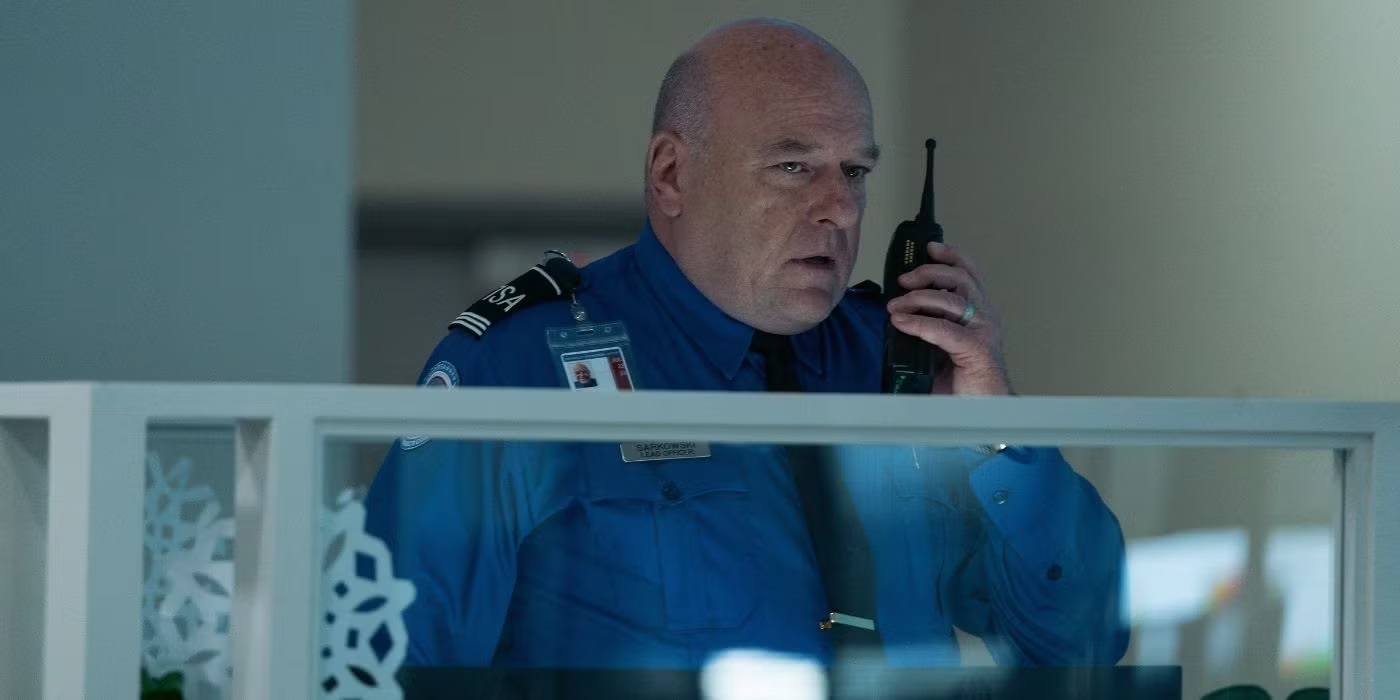
Collet-Serra’s direction excels at pacing and space. The camera moves with purpose, showing us the terminal layout and behind-the-scenes corridors. Unlike many modern action films with frantic editing, Carry On uses steady cuts and framing. We always understand what is happening and what is at stake physically. The rare action moments feel more potent because of this clarity. Collet-Serra, experienced with contained thrillers like The Commuter knows how to draw tension from everyday details. A piece of luggage on a conveyor belt can create suspense; a subtle glance can signal danger. The premise’s simplicity allows these details to shine.
While the film invites comparisons to Die Hard due to its setting and premise, Carry On never feels like a knockoff. It acknowledges the standard set by that classic and updates the formula for modern times. Characters use smartphones, digital security measures, and navigate an environment far removed from 1980s corporate towers. Our fears have shifted. Still, the film retains that timeless lone hero facing impossible odds. The nods to its predecessor are subtle, never overshadowing its originality.
Moral tension is a key strength. Instead of large-scale destruction or conspiracies, Carry On remains intimate. The danger hinges on a single choice. Ethan must either commit an act that endangers many or refuse and risk his own happiness.
We consider what we might do in his place. Would we uphold duty to the public or yield under pressure to save a loved one? This conflict feels human. The action thrills, but the moral struggle grounds the film.
Production design impresses by capturing the holiday travel atmosphere. Decorations, announcements, and impatient travelers create a setting at once cheerful and stressful. The airport, meant for safe passage, becomes ominous. The holiday details enhance the tension. This is no heartwarming Christmas tale; it shows how even festive surroundings can turn threatening.
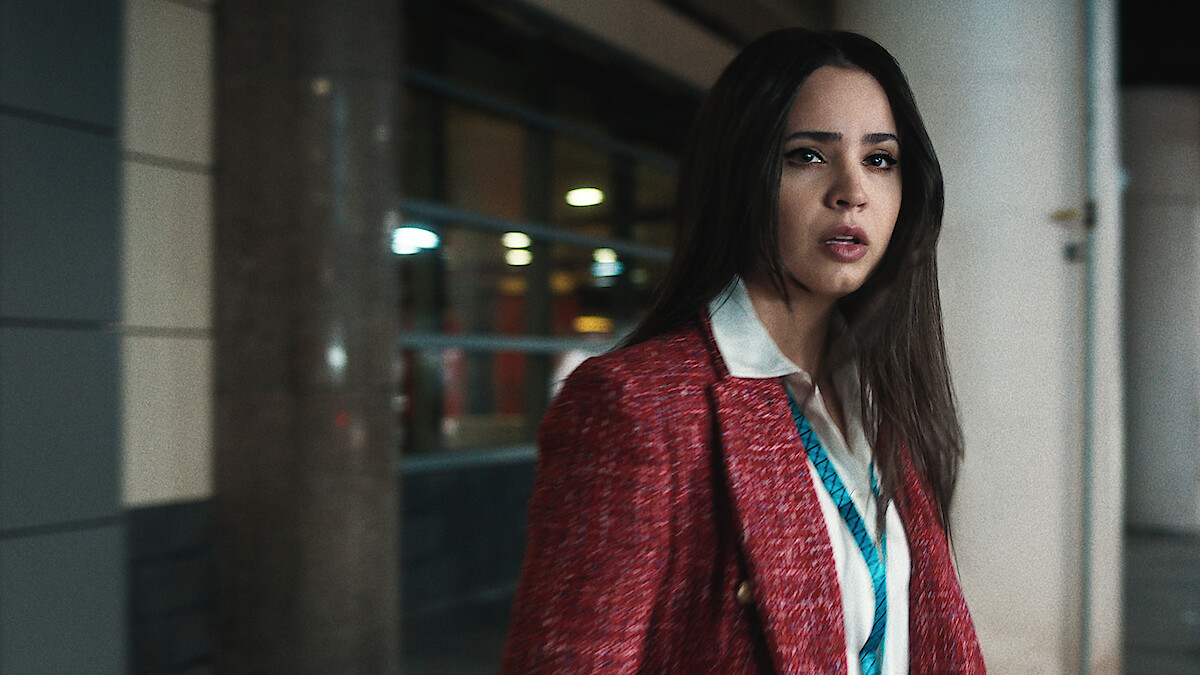
The plot never overcomplicates its central conflict. Viewers expecting major twists may be surprised that the core threat remains straightforward. Even as events expand beyond the checkpoint, Ethan’s moral dilemma stays central. This prevents narrative bloat. By the climax, we have spent enough time with Ethan to feel the gravity of his choices. The resolution avoids cheap tricks, emerging naturally from character decisions and environmental constraints.
Carry On has minor flaws. Some secondary characters lack depth, and a few logical leaps might strain credibility. Yet these issues never overshadow the film’s accomplishments. They stem from its tight focus. By not wandering into unnecessary subplots, it maintains tension and pace.
Sound design and music remain understated. Ambient noises remind us of the setting, and the score supports tension without overwhelming it. This restraint matches the film’s core philosophy: trust the audience’s intelligence and let the situation speak for itself.
Dialogue feels natural. Characters talk like real people, without jargon or long speeches. In a story where extraordinary pressure occurs in an everyday place, authenticity matters. Simplicity keeps us invested in the unfolding crisis rather than the language used to describe it.
Themes go beyond moral dilemmas. The film touches on trust, professionalism, and the quiet heroism of ordinary people doing their jobs. Safety often depends on such individuals, and a cunning villain can exploit these systems. Carry On does not condemn the system outright. It shows how easily it can be corrupted, reminding us that beneath daily routines lies a fragile order. Consider how information security can be compromised or how a moral dilemma tests personal boundaries.
The holiday setting amplifies the contrast. Christmas evokes generosity and reunions. Here, travelers just trying to get home become unwitting pawns in a deadly game.
The film subverts our expectations, making the danger more personal. As we watch, we imagine the hopes of these travelers, making their potential peril more affecting.
The tension builds slowly, which may frustrate those craving constant action, but patience is rewarded. When action arrives, it carries weight because we understand what’s at stake. Every decision affects Ethan’s fate and those around him.
Moral tension remains the heart of the film. The central question—how far would you go to protect a loved one—lingers after the credits roll. Some may wish for deeper philosophical exploration, but the balance feels right. We leave uneasy, as any moral dilemma should leave us.
Egerton excels, communicating fear, resolve, and heartbreak with restraint. He is neither a superhero nor a generic action star, just a man caught in a nightmare. We believe in him and empathize with his turmoil. Bateman’s villain never needs to shout; his calm authority is enough to unsettle us.
The cinematography is clear and calm, highlighting the terminal’s layout without flashy effects. Authenticity matters. By keeping visuals grounded, the film avoids distraction. Even minor futuristic elements remain believable, ensuring we stay in the moment.
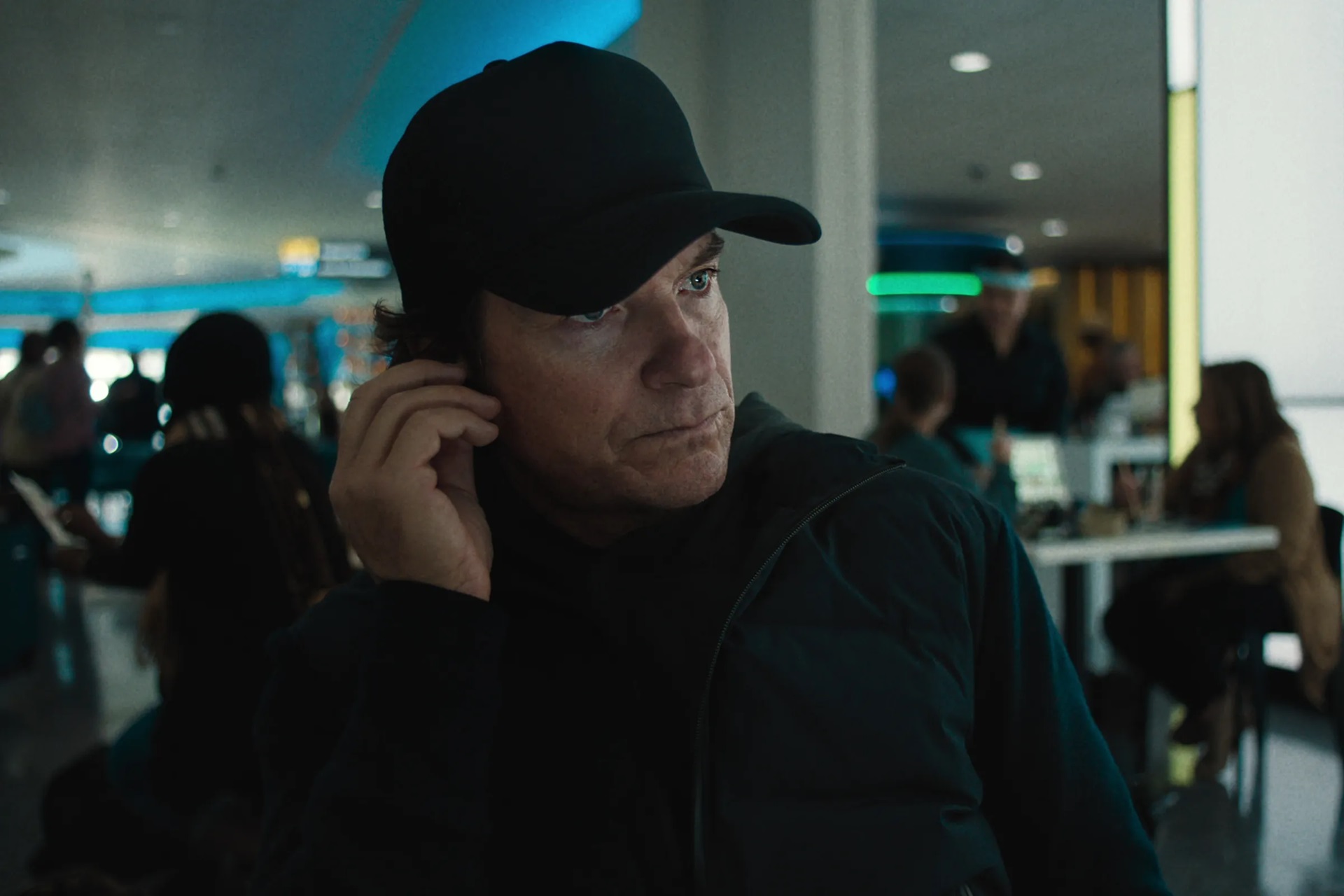
When the credits roll, Carry On makes a strong impression. It might not become a timeless classic, but it delivers on its promises: tension, moral complexity, and a test of ordinary values. In an era where many films try to overpower with spectacle, this one impresses with restraint. Characters, stakes, and moral conflict matter more than explosions.
Released during a season often associated with lighter fare, Carry On offers a different view. Instead of comforting traditions, it presents sudden danger and ethical quandaries. Perhaps true holiday spirit involves empathy and protecting others, even under threat. Consider how this resonates with real-world concerns about holiday airport setting and the vulnerability of travelers.
By trusting its premise and its audience, Carry On distinguishes itself. It shows that a single setting, a handful of characters, and a terrifying ultimatum can create a powerful story. The holiday season can still surprise us, hosting tales that challenge our morals and nerves.
The film’s simplicity and moral ambiguity make it memorable. In a market saturated with spectacle, Carry On relies on human conflict. It reminds us that old-fashioned tension and grounded drama can still captivate. Its approach is quiet, but it resonates, asking tough questions without offering easy answers.
Carry On is worth watching for its balanced storytelling and understated performances. It may not redefine holiday cinema, but it provides a welcome perspective.
Danger can lurk where we least expect it, and even festive times cannot guarantee safety. Streaming on Netflix, it stands apart from the usual holiday fluff.
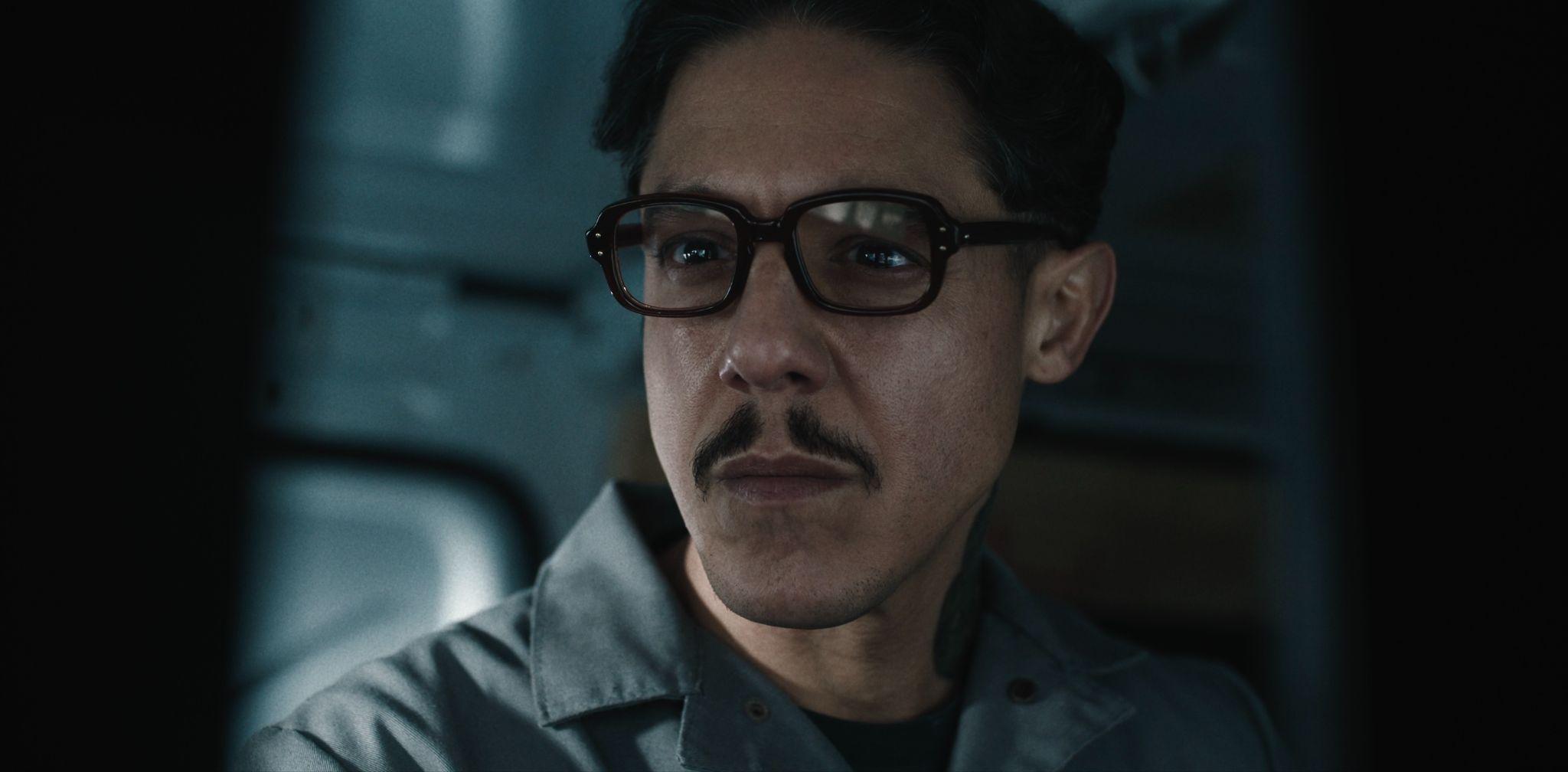
If we debate whether Carry On qualifies as a holiday movie, the argument is moot. Its setting and timing influence tone and expectations, which it uses to challenge assumptions. This subtle commentary adds depth, suggesting that even during a season devoted to peace and joy, threats may lie hidden. As viewers, we might recall discussions around whether Die Hard is a Christmas movie, a question often debated in pop culture spaces like Vulture or The Atlantic.
In a crowded market, Carry On relies on human tension rather than visual bombast. It respects viewers, trusting that moral stakes and a tight scenario can hold our attention. It highlights how ordinary people and routines maintain our safety. When that stability is threatened, heroes can emerge from unexpected places, much as real-life airport security measures are designed to protect countless travelers daily.
Ultimately, Carry On proves that less can be more. Its premise is simple, its stakes personal, and its approach uncommonly direct. The result is a thriller that lingers in our minds. Far from formulaic holiday cheer, it offers a different gift: a moment to consider what truly matters when pushed to the edge.
That might be its finest achievement. It avoids empty spectacle, anchoring its action in a timeless moral question. By doing so, it becomes more than just another release. It stands as a quiet statement that even amid the bustle and brightness of a holiday airport, our choices define us. And in that reflection, we find a resonance that goes beyond the screen, echoing in the spaces where fear, duty, and love collide.
